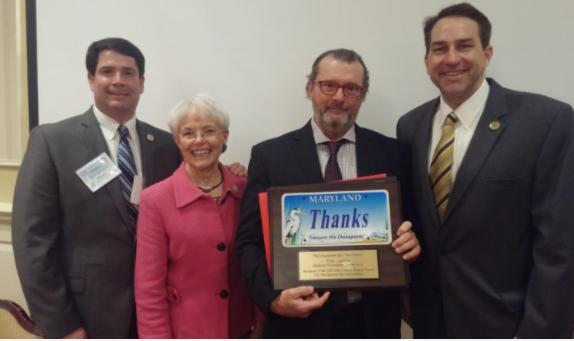Timothy D. Junkin, founder of Midshore Riverkeeper Conservancy (MRC), is the winner of the 2017 Ellen Fraites Wagner Award for Chesapeake Bay Stewardship. The award was presented by the Chesapeake Bay Trust (CBT) during its Legislative Reception & Awards Program on January 12 at the Miller Senate Building in Annapolis.
The award, named for an individual instrumental in establishing the Chesapeake Bay Trust, recognizes an environmental leader who has worked to improve the natural resources of the Chesapeake Bay region. The award recipient is someone who has inspired others by promoting environmental awareness, leading successful restoration and protection efforts, and advancing grant projects funded by CBT. Junkin has exemplified these qualities in protecting the Midshore rivers and their surrounding environments.

Upon receiving the 2017 Chesapeake Bay Trust’s 2017 Ellen Fraites Wagner Award for Chesapeake Bay Stewardship, Tim Junkin is congratulated by Delegate Christopher Adams, Senator Addie Eckardt and Delegate John Mautz. Photo by Isabel Hardesty
In eight years, the organization conceived and galvanized by Tim Junkin’s vision has grown to a cadre of clean water advocates working at every level to protect and restore the rivers of the Mid-Shore region. MRC has grown to ten full-time river advocates, including two Riverkeepers, a watershed scientist, and a team of educators. It has expanded the scope of its programs and continues to strengthen its policy advocacy in Annapolis and in local towns and counties. The organization aims to directly reduce pollution entering local waterways and to inspire its communities to insist on healthy rivers. Working collaboratively with farmers, MRC has pioneered the design and construction of innovative processes to reduce agricultural runoff. In spring 2016, in partnership with Chesapeake Bay Maritime Museum, MRC launched the first pumpout boat on the Eastern Shore, which will resume operation in May 2017, offering free services to boaters on the Miles and Wye Rivers.
The relationship between MRC and CBT has strengthened over the years. MRC is a strong supporter of CBT’s mission to promote public awareness in the protection and restoration of the Chesapeake Bay and its rivers. CBT supports many of MRC’s programs. Most recently, MRC received a grant from CBT in support of its new community initiative, Stewards for Streams: Faith-Based Conservation. The purpose of this program is to engage congregations of every denomination to prioritize environmental stewardship. CBT continues to support MRC’s education program Students for Streams, an innovative education program designed to meet Maryland’s environmental literacy requirements. During the 2015-2016 school year, over 800 students from five high schools in three counties participated in both classroom and field study. Over the past two school years, students have planted 10,000 trees in streamside buffers.
MRC has greatly benefited from CBT’s Chesapeake Conservation Corps (CCC) Volunteer program. This initiative pairs young adults with organizations that provide hands-on environmental leadership and technical training for a one-year term of service. MRC has been a host organization for the past five years and has gone on to hire three volunteers as full-time employees.In addition to education and outreach, CBT has awarded grants to MRC in support of its restoration and design efforts, research, lawn fertilizer curtailment, and water quality monitoring. With the support of CBT, MRC produces and distributes an annual State of the Rivers Report Card and hosts two community events to discuss the health of Mid Shore rivers.
Working annually with approximately 1,000 volunteers, MRC hosts activities throughout the year to promote awareness and community action. The organization has built support for clean rivers and continues to expand its reach and increase its partnerships. Importantly, it regularly engages in state and regional advocacy and has become a leading voice from the Eastern Shore.
All of this vital work began with and was nourished by the vision of Tim Junkin who reached into our communities with a steadfast call-to-action for clean rivers. Our community resoundingly responded.



Write a Letter to the Editor on this Article
We encourage readers to offer their point of view on this article by submitting the following form. Editing is sometimes necessary and is done at the discretion of the editorial staff.